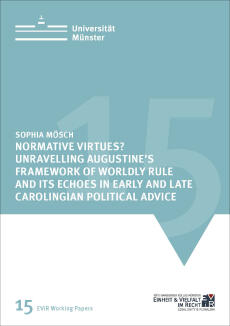New working paper on Carolingian rule

In the newly published EViR Working Paper No. 15, Sophia Mösch examines the hitherto lesser-considered conceptual framework of worldly rule in Augustine's De civitate Dei (The City of God). The focus is not on the virtues that have been the main focus of research, but on shared goals as the basis of political communities – an approach that was taken up and interpreted in different ways by Carolingian advisors.
Alcuin of York (735–804), Charlemagne's most important advisor, interpreted his reign as a collective Christian enterprise, while Hincmar of Reims (c. 806–882) saw justice (iustitia) centered in the figure of the ruler, who realised divine justice (vera iustitia) under clerical oversight. These different interpretations reflect changing political realities and lead to different models of Christian leadership.
The paper thus opens up new perspectives on the role of political advice in the Carolingian Empire and the interplay between divine and secular law.
The Author:
Dr Sophia Mösch is a research assistant at the Käte Hamburger Kolleg ‘Legal Unity and Pluralism’ since 2021. At the Kolleg, the historian is conducting research on a project entitled ‘Developing Principles of Good Governance: Political Advice during the Carolingian, Macedonian and Seljuk Reforms’.
The EViR Working Papers
The EViR Working Papers are a digital and printed series to publish current research reports, conference papers and joint working papers. It is interdisciplinary and intertemporal in nature and offers a good insight into the diverse research topics of the Kolleg. As an open access publication, it can be accessed via the University’s publication server miami as well as via the website of the Kolleg.

